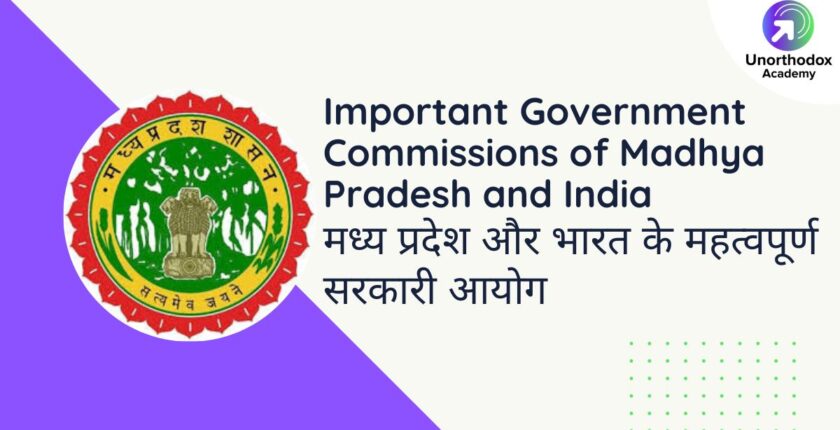Unorthodox Academy > New Article > Madhya Pradesh Specific Notes > Important Government Commissions of Madhya Pradesh and India
Important Government Commissions of Madhya Pradesh and India
- May 10, 2022
- Posted by: Admin
- Category: Madhya Pradesh Specific Notes MP Patwari Exam MPPSC State PSC Exams Whats New
1 Comment

In this article you will learn about the Important Government Commissions of Madhya Pradesh and India. This article will help student to fetch more marks in various state exams like MPPSC, MP Vyapam, MP Jail Prahari, MP Police etc. There will be 4-5 questions could be asked related to Important Government Commissions like Election Commission, NITI Aayog, Finance Commission.
Important Government Commissions of Madhya Pradesh and India
| Important Commissions in Madhya Pradesh | ||||
| S.No. | Commission | Estb. year | Headquarters | Chairperson |
| 1. | State Election Commission | 1994 | Bhopal | R. Parshuram |
| 2 | State Human Rights Commission | 1995 | Bhopal | Justice Narendra Kumar Jain |
| 3. | Madhya Pradesh State Women Commission | 1998 | Bhopal | Shobha Oza |
| 4. | State Child Protection Commission | 2008 | Bhopal | – |
| 5. | State Scheduled Castes Commission | 1995 | Bhopal | Anand Ahirwar |
| 6. | State Scheduled Tribes Commission | 1995 | Bhopal | Narender Marawi |
| 7. | State Backward class Commission | 1993 | Bhopal | JP Dhanopia |
| 8. | State Information Commission | 2005 | Bhopal | A.K. Shukla |
| 9. | State Minorities Commission | 1996 | Bhopal | Niyaz Muhammad Khan |
| 10. | Madhya Pradesh Wakf Board | 1995 | Bhopal | Shakil Chandina |
| 11. | State Finance Commission | 1994 | – | Himmat Kothari |
| 12. | State Administrative Tribunal | 1985 | Principal bench- Jabalpur | Ramesh Singh Thakur (Judicial)Naini Jayaseelan (Administrative) |
| 13. | Madhya Pradesh Public Service Commission | 1956 | Indore | Bhaskar Chaube |
| 14. | State Vigilance Commission | 1964 | Bhopal | – |
| Important Commissions in India | |||||||
| S.No. | Commission | Estb. year | Headquarters | First Chairperson | Latest Chairperson | Composition | Objective |
| 1. | National Human Rights Commission | 1993 | New Delhi | Ranganath Misra | Vacant | 1 chairman and 7 other membersChairperson, National Commission for Scheduled CastesChairperson, National Commission for Scheduled TribesChairperson, National Commission for MinoritiesChairperson, National Commission for WomenChairperson, National Commission for Backward ClassesChairperson National Commission for Protection of Child RightsChief Commissioner for Persons with Disabilities | Responsible for the protection and promotion of human rights, defined by the Act as “Rights Relating To Life, liberty, equality and dignity of the individual guaranteed by the Constitution or embodied in the International Covenants and enforceable by courts in India. |
| 2. | National Commission for Women | 1992 | New Delhi | Jayanti Patnaik | Rekha Sharma | – | Review the Constitutional and Legal safeguards for women ;recommend remedial legislative measures ;facilitate redressal of grievances andadvise the Government on all policy matters affecting women |
| 3. | National Commission for Protection of Child Rights (NCPCR) | 2007 | New Delhi | – | Priyank Kanoongo | 1 chairman and 7 other members | Form special cells in schools to solve problems of children. The cell will examine the mental and physical torture against children. |
| 4. | National Scheduled Castes Commission | 2004 | New Delhi | S. H. Ramdhan | Prof. Ram Shankar Katheria | a chairman, a vice-chairman and four other members. | Generate an atmosphere conducive to the all-round development of children besides safeguarding SC interests |
| 5 | National Scheduled Tribes Commission | 2004 | New Delhi | Kunwar Singh | Nand Kumar Sai | a Chairperson, a Vice-Chairperson and three full-time Members (including one female Member) | Oversee the implementation of various safeguards provided to Scheduled Tribes under the Constitution. |
| 6. | National Commission for Backward Classes | 1993 | New Delhi | Justice (Retd.) R N Prasad | Bhagwan Lal Sahni | a Chairperson, Vice-Chairperson and three other Members | To look into all the grievances, rights and safeguards relating to Backward Classes). |
| 7. | Central Information Commission | 2005 | New Delhi | Wajahat Habibullah | Y K Sinha, IAS | one chief information commissioner and not more than ten information commissioners | – |
| 8. | Central Vigilance Commission | 1964 | New Delhi | Nittoor Srinivasa Rau | K. V. Chowdary | one Central Vigilance Commissioner and two Vigilance Commissioners | To address governmental corruption |
| 9. | National Green Tribunal | 2010 | Principal Bench- New Delhi | Justice Lokeshwar Singh Panta | Adarsh Kumar Goel | Chairman (retired justice) and other judicial members | handle the expeditious disposal of the cases pertaining to environmental issues |
| 10. | Union Public Service Commission | 1926 | New Delhi | Sir Ross Barker (pre- independence)H. K. Kripalani (post- independence) | Pradeep Kumar Joshi | Chairman and other members | responsible for appointments to and examinations for All India services and group A & group B of Central services |
| 11. | Central Administrative Tribunal | 1985 | New Delhi | Justice K. Madhav Reddy | Justice E L Narasimha Reddy | One chairman and 5 other bench members | adjudication of disputes and complaints withrespect to recruitment and conditions of service of persons appointed to publicservices and posts in connection with the affairs of the Union or other authoritiesunder the control of the Government. |
| 12. | National Commission for Minorities | 1992 | New Delhi | Syed Ghayorul Hasan Rizvi | Vacant | One Chairperson, one Vice-Chairperson and five Members | Evaluate the progress of the development of Minorities under the Union and States |
| 13. | Central Waqf Council | 1964 | New Delhi | – | Ministry of Minority Affairs, Govt. of India | One Chairperson, and not more than 20 Members | Advising it on matters pertaining to the working of the State Waqf Boards and proper administration of the Waqfs in the country. |
| 14. | Finance Commission | 1951 | – | K. C. Neogy | N. K. Singh (15th Finance Commission) | a chairman and four other members | Distribution of ‘net proceeds’ of taxes between Center and the States, to be divided as per their respective contributions to the taxes. |
| 15. | NITI Aayog | 2015 | New Delhi | – | PM of India (chairman)Rajiv Kumar, (Vice Chairperson)Amitabh Kant, (CEO) | The Prime Minister as the Chairperson.A Governing Council composed of Chief Ministers of all the States and Union territories with Legislatures and lieutenant governors of Union Territories(except Delhi and Pondicherry)Regional Councils composed of Chief Ministers of States and Lt. Governors of Union Territories in the region to address specific issues and contingencies impacting more than one state or a region.Full-time organizational framework composed of a Vice-Chairperson, four full-time members, two part-time members (from leading universities, research organizations and other relevant institutions in an ex-officio capacity), four ex-officio members of the Union Council of Ministers, a Chief Executive Officer (with the rank of Secretary to the Government of India) who looks after administration, and a secretariat.Experts and specialists in various fields. | Achieve sustainable development goals with cooperative federalism by fostering the involvement of State Governments of India in the economic policy-making process using a bottom-up approach. |
| 16. | Election Commission of India | 1950 | New Delhi | Sukumar SenV. S. Ramadevi (first women) | Sunil Arora | A three-member body, with one Chief Election Commissioner and two Election Commissioners. | conduct of elections to parliament and state legislatures and to the offices of the President and Vice-President. |
MPPSC Free Study Material (English/Hindi)
🤩Follow Our Social Media Handles
YouTube 👉 https://bit.ly/36wAy17
Telegram👉 https://bit.ly/3sZTLzD
Facebook 👉 https://bit.ly/3sdKwN0
Important Books for Civil Service Student – Amazon Best Buy Link
Daily Current Affairs Quiz for UPSC, MPSC , BPSC and UPPSC : Click here for Month Wise Quiz

